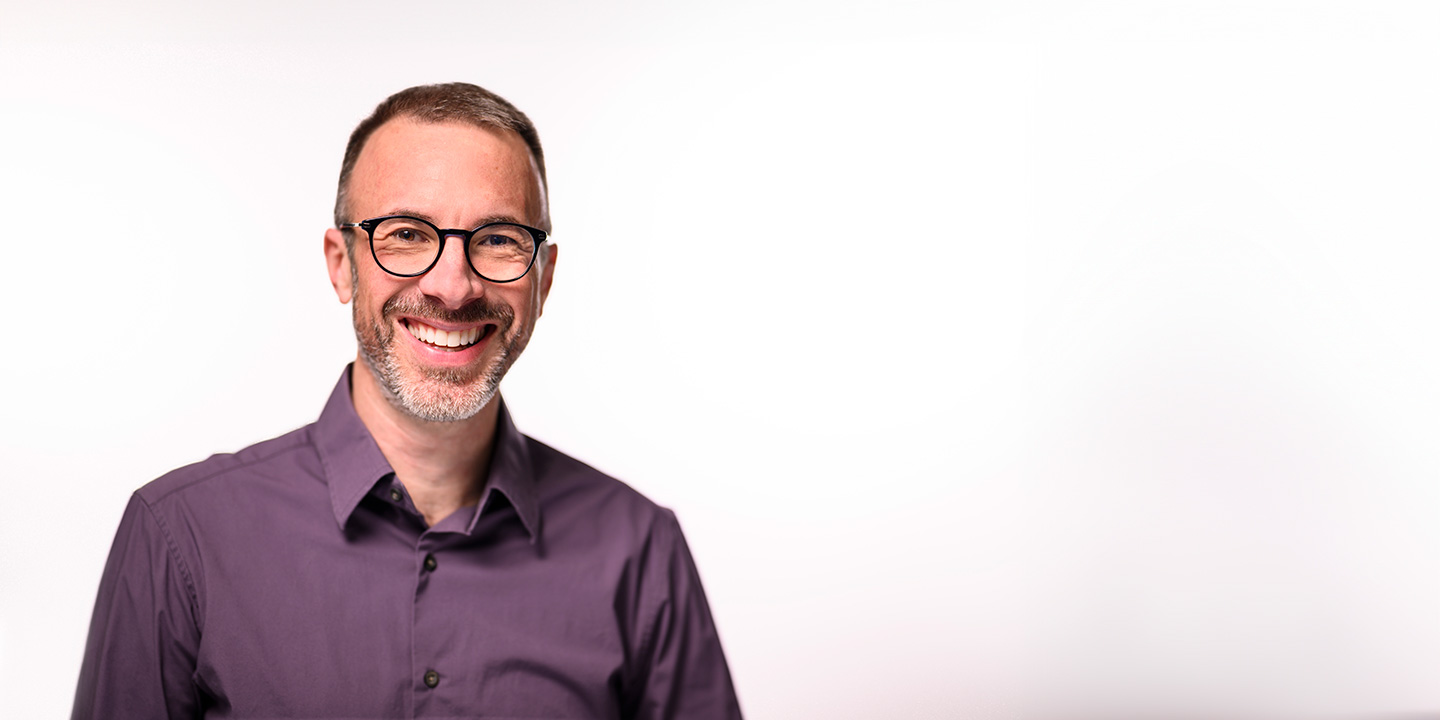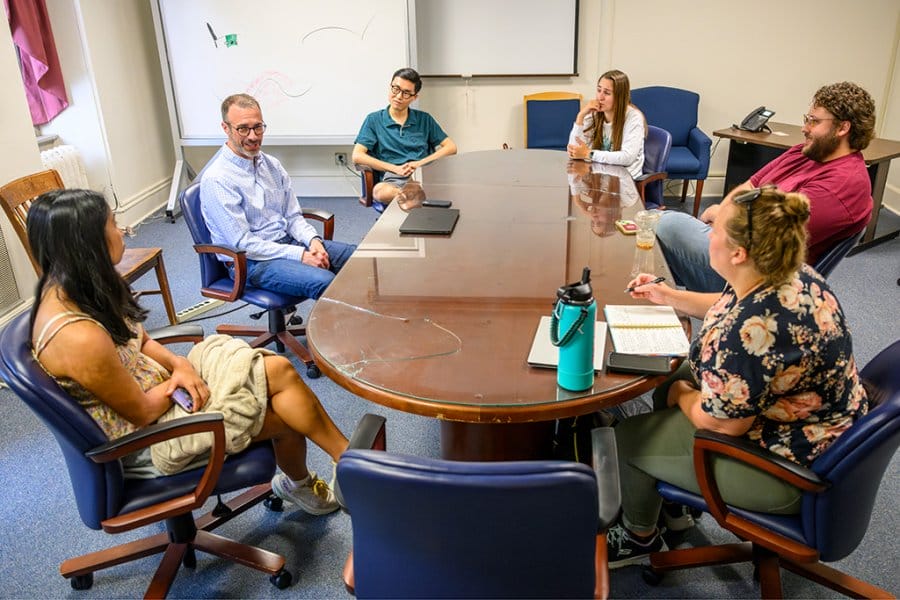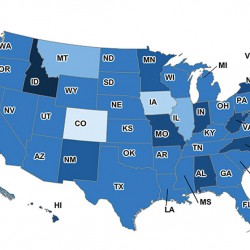
The UW’s Political Sage
In partisan times, Barry Burden is the go-to source for factual election information.
Election Facts and Fallacies
Barry Burden fields a lot of election questions, whether from the New York Times or patients in his dentist’s waiting room. Here’s a sampling of the wisdom he regularly dispenses.
- The United States is unlike any other democracy on the planet in its elections. Campaigns are months longer, fundraising is far greater, and no other country has the series of primaries and caucuses to pick presidential nominees.
- The two-party-dominated system and the Electoral College are also unique aspects of U.S. politics.
- Presidential tickets don’t fare better in the home states of vice president picks or the states where the parties hold their conventions.
- Studies show that Democrats aren’t advantaged by higher rates of voting by mail.
- In recent years, older voters have leaned Republican, while younger voters leaned heavily Democratic. Yet as recently as 2000, voting patterns were similar across age groups.
- Voter turnout varies mainly across states rather than by election. For generations, national turnout in a presidential election has not varied by more than 15 points. But in 2020, the gap between the state with the lowest voting rate (Mississippi) and the one with the highest (Oregon) was twice that number.
— M.C.
UW political science professor Barry Burden sits in the local Madison Club, ready to lecture on the rhetoric of political conventions to a bipartisan group of insiders. But moderator Jeff Mayers MS’89 of the news service WisPolitics tosses Burden a curveball, jettisoning the announced topic in favor of breaking news on the guilty verdict in the federal gun trial of presidential son Hunter Biden.
Burden is unperturbed, calmly awaiting the new line of inquiry with an attentive gaze. Refocusing on hot political news du jour is his stock-in-trade. The first question is on a court case decided the prior day. Later, a guest asks about a New York Times article in that morning’s paper. Burden responds authoritatively every time. Is it possible to trip this guy up?
Burden is a world-renowned expert in American electoral politics, holds the Lyons Family Chair in Electoral Politics at UW–Madison, and is a frequent media source due to his unimpeachably nonpartisan, factual approach. “He’s tackling the big questions, but he’s doing it from the perspective of a social science researcher, as opposed to an advocate who has a point of view,” says Susan Webb Yackee, director of the UW La Follette School of Public Affairs. “And in our very purple state, Barry’s approach to scholarship is noteworthy.”
Burden is one of the top scholars in campaigns and elections, according to Charles Stewart III, Massachusetts Institute of Technology political science professor and Burden’s coeditor on The Measure of American Elections. “Anything he writes becomes an instant must-read in the field.”
Burden enjoys the unexpected. In this election year of extreme political upheaval, his wealth of knowledge is more sought after than ever. Whether talking to election observers from Japan or journalists from Argentina, Sweden, or Singapore, he never knows what questions might be asked when he picks up his phone. And he thrives on that.
“Being a political science professor, I think, is different from any other discipline on campus because it is moving constantly,” says Burden. “There might be developments that morning before I’ve had breakfast, or in the hour before I walked into the classroom, that other people are aware of that I am not. So it has a different pace than music or math or astronomy or even related fields like sociology and psychology.”
The Madison Club presentation runs overtime due to the unusually “enthusiastic, engaged audience,” according to Mayers. Among the first to leave the room is an apologetic Burden — a Milwaukee TV station is outside waiting to interview him. Welcome to his life.
Beasts of Burden
Three graduate students casually pull up chairs around an aged wooden table on the second floor of North Hall, just above Burden’s office. Clutching a paper coffee cup, he convenes the biweekly meeting of the Beasts of Burden — a group of his doctoral advisees. The conversation flows from data sets to research scope, and he wraps up, as is customary, by asking, “What media have you been consuming?” Someone mentions an episode of the game show Game Changer where contestants get blamed for messing up despite never being told the rules. Burden jokes: “Is this a metaphor for how professors interact with students?”
There’s a new twist at this particular meeting. The students summarily dismiss their adviser from the room so they can talk about Burden behind his back.
“He was the whole reason I came to the UW,” attests Jess Esplin MA’23, PhDx’26. She wanted to study election reform, so she reached out to experts nationwide. Burden responded with a timely email — something she now knows is his standard procedure.
“He makes an effort to make himself available,” she says. “He’s one of the only academics who can keep up on their emails.”
Burden is careful with his word choices, has high expectations, and forces students to also be clear and concise, notes Matthew Kim ’22, PhDx’25. He credits Burden with drawing in students and encouraging participation. “You never feel on the sidelines.”
Jacqueline Qiu PhDx’28 felt comfortable breaking down in tears in his office when struggling with health and academic challenges. Burden handed her a tissue and listened. “He’s really empathetic, considerate, and an excellent teacher with clear expectations — the best I’ve had,” she says. “His classes have always been my favorite, although they’re also the hardest.”
Esplin lifts her phone to show a picture from a class where students dressed up in “standard Barry uniform” — some variety of a blue plaid button-down shirt with jeans. They dub him a nerd, a dad figure, a Star Wars fan, and a lover of the black cat on his phone’s home screen. Several times a year, his grad students are invited to a gathering at his house, where his persona remains the same: Always considerate. Always empathetic. And always the professor.
During the years Levi Bankston MA’18, PhD’23 spent at UW–Madison, Burden was his boss at the Elections Research Center, as well as his adviser and mentor. He jokes that Burden has a robot-like ability to retain facts in spite of his busy schedule.
“If it weren’t for good professors, empathetic professors, like Barry Burden,” Bankston says, “I probably would have quit the program.”
Burden is so serious about his role as a professor, according to his wife, Laura Burden, that he never cancels his classes — even right after she had a baby.
Yet when Burden began college, he viewed politics as a hobby and couldn’t conceive of professor as a job option.
Zero Politics
When Burden, now 53, arrived at Ohio’s Wittenberg University, he didn’t understand what a syllabus or midterms were. He was a first-generation college student and felt at a disadvantage.
Burden grew up in Newark, Ohio, where his mother worked in a civilian support role in the Air Force and his father ran a machine and welding shop. In the Burden home, politics was absent.
“There was zero politics in my school environment, zero politics in my home environment,” recalls Burden. “I don’t know who my parents voted for, or if they even voted, which I think is part of what made it interesting to me. I felt like it was something going on in the world that I was being denied access to. So I was curious.”
He adds: “My career has been made in a place that none of my family knows much about.”
The television was on in his home, however, and there were only a handful of stations, so Tom Brokaw on NBC Nightly News was a backdrop to family evenings. When he was a senior in high school in 1988, his class did a mock debate where Burden played Democratic nominee Michael Dukakis. He demurs when asked if he won the debate: “I think I had done more homework than anyone else in terms of preparing.”
At Wittenberg, he tutored and majored in math, but it lacked the element of surprise that inspires him. So he rushed through a political science major in his junior and senior years, preparing for a career in campaign consulting, polling, or a similar field.
The more Burden saw of politics, the sillier it appeared to him. For example, he recalls President Bill Clinton’s expectation that his administration could reform the U.S. health care system top to bottom in his first six months in office. “You people are bananas,” thought Burden. “You’re trying to upend a huge part of the economy. Good luck with that.”
Several supportive mentors redirected him onto the path of becoming a political science professor, and he earned his doctorate at Ohio State University.
“Burden is tackling the big questions, but he’s doing it from the perspective of a social science researcher, as opposed to an advocate who has a point of view.”
Today, Burden is the only professor who sits on the First-Generation Badgers working group, offering support and networking for the 20 percent of UW–Madison students who are the first in their families to attend college. “I think the task force believed that having a faculty member as a member was a nice sign for students that you can go from being a high school graduate like everyone else in the family to being a college professor,” he says. “That path is open to you.”
Burden got his first job as a professor at Louisiana State University, then moved to Harvard University. Harvard had the draw of new experiences, from being on an Ivy League campus to taking the subway to accessing the top politicians and scholars who regularly visited campus.
But after seven years at Harvard, he was looking for a place to settle down with his wife and two children where he could build a lifelong career. UW–Madison had a reputation for its prominent scholars in American government.
“I knew it had a great graduate program,” he says, “and I knew about Madison’s reputation as a place to live.”
That was 2006. Since then, his work in political science has taken him places he never expected.
Lights, Camera, Action
A young Burden would have been shocked to learn that his career would land him in documentaries like Fahrenheit 11/9 and An Unreasonable Man, with his own IMDB entry. Attorneys also seek him out as an expert witness on elections law. He’s selective about the requests he accepts, just as he is with media requests.
“I can be picky about the things I want to do,” he says. “What’s going to be interesting or rewarding? Or where can I have a real impact on the law?”
Burden has testified in battles over voter ID, ballot drop boxes, and election results, which are increasingly waged in the courts.
MIT’s Stewart has been on the same and opposing sides of Burden in court and has found him to be unflappable. “He is very calm, very assured, very easygoing,” says Stewart. “He is an easy witness to listen to.”
Burden says that being an expert witness is different from being a teacher or researcher. “You can’t be equivocal, and you can’t be complicated or ambiguous.”
Burden has to sign his written reports under penalty of perjury, followed by taking the witness stand under oath and being cross-examined by attorneys looking to trip him up with any past tweet or syllabus or quote. He’s testified in a half-dozen states, maintaining his disciplined adherence to statistics and facts in high-stakes situations.
Indeed, Burden isn’t fazed by much of anything, whether aggressive legislators or media. “You might think that would make someone in my role be more cautious about things they say, getting in trouble or offending one side, but I don’t think I’ve been very cautious, and it has not gotten me in trouble,” he says. “If your analysis is based on facts and proper social science standards, it’s pretty difficult for people to argue.”
Too Much News
The 2024 election season offered scholars plenty of riveting material. As President Joe Biden withdrew from the race, Burden took to X to succinctly explain the situation to his nearly 6,000 followers.
“It’s unlike any other presidential election in our lifetimes,” he says. “There are so many elements that are one-off and strange compared to the historical record of how elections usually work.”
The pinned post on Burden’s X profile from 2020 reads: “There is too much news.”
In this year of extreme political upheaval, Burden’s wealth of knowledge is more sought after than ever.
Election season has become 24/7, no longer taking a break in off-cycle years or summer or even holidays, notes Burden. And recent events, such as the violence on January 6, 2021, once “seemed out of the realm of possibility.”
Fear is heightened, but Burden offers reassurance that many elements remain consistent.
“I tell my students this: every election is different, but also every election is the same. We know Oklahoma is going to vote for the Republican candidate — doesn’t matter who the nominee is or anything else. So there are those kinds of stable, repeatable things that are known in advance.”
While Burden can confidently answer any reporter’s query about elections, one question does trip him up.
Go, Go, Go
When asked about his hobbies, there is a long pause. “I’m a runner.”
He hesitates, thinks some more.
“Not a lot of other hobbies that I’m super invested in. I play golf a little bit. We’ve had a poker group on and off over the years.”
Burden’s family is also active in the Unitarian church in Madison. That’s another thing, he realizes, that was not a part of his childhood.
“Just as I felt like politics was being withheld from me, religion might be the same way. We were not churchgoers, no talk of that, never inside a church building. I didn’t know what happened in those places. And so it generated a kind of curiosity on my part.”
Laura Burden, a social worker and his wife of more than 30 years, says her “go, go, go” husband needs more hobby time. The family did take a summer vacation, during which he struggled to build a fire.
“By the last night, he realized exactly what he needed to do,” she says. “It’s Barry to his core: he’s gonna approach things very logically, march through, figure it out — and he’s gonna get it right. And then you’re gonna have a fire.” •
Melanie Conklin MA’93 is a Wisconsin journalist and political communications director.
Published in the Winter 2024 issue




Comments
No comments posted yet.